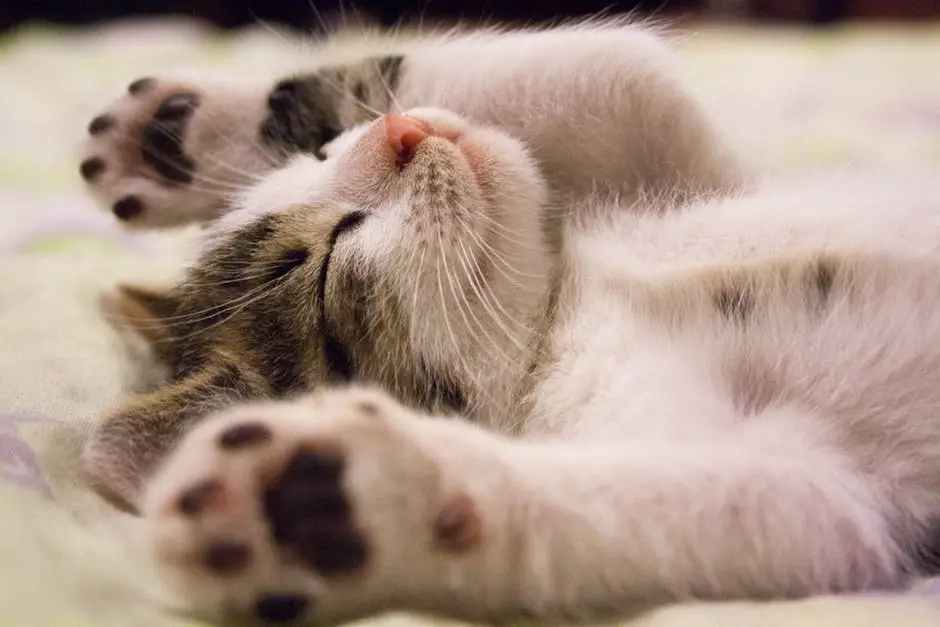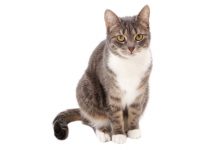23 million American households adopted a pet in the first year of the COVID-19 pandemic. The great news is that an overwhelming majority of these households still have that pet and are not considering rehoming their pet soon.
If you adopted a kitten, it’s no doubt that kittens are an adorable bundle of energy. But by now, you may be wondering when your cat will mellow out and calm down.
Keep reading to learn this answer to this and more.

Contents
When Do Cats Calm Down?
By age one, your kitten will significantly calm down. This isn’t to say all of its energy will be gone. However, you can see a big difference between a three-month-old kitten and a twelve-month-old cat.
Around this time, you will notice your cat’s personality more. For example, some cats are naturally more playful, while others are lazier.
As with other animals, cats will continue to mellow with age as they have more experience and less curiosity in their environment.
Cats also get wiser with age, so their hyperactivity and play will continue to lessen as they get older. So let’s take a closer look at a cat’s energy levels as it ages.
Birth — 2 Months Old
During the first two months of a kitten’s life, it’s nursing and moving around. They don’t have enough muscle or coordination to do anything with purpose.
At two months, kittens still move awkwardly and stumble.
3 — 6 Months
At three months, kittens are fully weaned from their nursing. After that, they become more active as their hunting instincts develop. Cats have a strong prey drive. This means they will follow and catch anything that looks like prey.
You will notice your kitten’s balance and motor skills improve during this time. Kittens are the most social and active during these months. Their curiosity is also high, making them extra playful and sometimes seem crazy.
If you want to leash train or socialize your kitten, now is the time to do so.
6 Month — 1 Year
At six months, your cat is officially a teenager. This means your cat will move toward sexual maturity. At this time, both male and female cats may mark their territory or show assertive behavior like aggression, biting, and scratching.
Neutering males and spaying females will help calm the cat considerably.
1 — 2 Years
Even after neutering or spaying, your cat will still have energy, but not the same hyper energy it did as a kitten. Your cat will transition into adulthood and reach maturity around age two.
Even though your cat will remain energetic, you will notice a difference between ages one and two as your cat becomes an adult.
3 — 5 Years
Once your cat reaches three years old, it will be significantly calmer than previously. But, your cat will remain active as these are its prime years.
They are comfortable with the environment and their routine, which brings contentment. But random bursts of energy are still likely.
6 — 10 Years
As a cat gets older, anxiety will alleviate because the cat is fully matured. Its desire to play may decrease as it ages and becomes more passive.
Mature cats rest more and weight gain can occur. Weight gain will further decrease their energy.
11 — 12 Years
At age 11, your cat is a senior. The amount of activity and energy will decrease noticeably. You will notice far less jumping, scratching, and clawing.
Senior cats are pretty sedentary.
13+ Years
Cats 13 and older are elderly. They lack the energy and ability to move efficiently.
The cat shouldn’t gain weight because it could lead to further lethargy and other health problems.
Why Do Some Cats Remain Hyper Throughout Their Life?
If your cat remains hyperactive into adulthood, there are a few explanations.
If a kitten is weaned too early because of abandonment or separation from its mother, it may develop hyperactive behaviors.
Lack of stimulation is also a major cause of hyperactivity. The cat will act out due to boredom or neglect.
How To Manage Hyper Cats
First, you need to determine why your cat is hyper. For example, if you have a young cat or your cat isn’t spayed or neutered, this will cause more energy.
Additionally, if you are out at work all day, your cat will crave your attention when you get home, showing signs of hyperactivity.
In general, cats need an enriched environment for mental, physical, and emotional well-being. If they don’t have a natural outlet for their energy, they could show unwanted behaviors.
Cats get bored quickly, so giving them fun activities will help their energy levels.
Cats love to scratch, hide, climb, and explore. Having a cat tower or cat tree can provide all four of these activities.
During playtime, you can also use interactive toys or simple toys like wands and teasers. Having set playtime is essential. It will limit their hyperactivity and improve your bond with your cat.
Plus, small toys can help mimic hunting, which cats love so much.
Further, your cat needs a scratching post. Scratching helps to relieve stress. A post also helps direct scratching away from the furniture.
If your cat is still full of energy after ample playtime, you can sit with it in a room to help it relax.
Continue reading When Do Cats Mellow Out and if your cat’s bread can affect hyperactivity.
Does Cat Breed Affect Hyperactivity?
Even though the domestication of cats occurred nearly 10,000 years ago, the study of breed-specific behaviors has been poorly studied. Unlike dogs, cats are still genetically close to the landrace cats of this time.
Thus today, the International Cat Association only recognizes 71 different cat breeds. On the other hand, the Federation Cynologique International officially recognizes 360 dog breeds. Some experts say this number tops 500!
So while cat owners and veterinarians note behavior differences between breeds, especially between pedigree and non-pedigree cats, there is no science to back up these theories.
Conversely, scientists have studied dogs far more extensively than cats. With a more varied genetic makeup than their ancestors (wolves), dogs show individual and breed differences in behavior.
Scientists are working toward studying cats more to understand breed differences. But, it will be some time before data reveals the best cat breed for calm energy.
From Crazy Cat To Mellow Cat
There is only so much you can do to help mellow out your cat since its energy levels are mostly based on natural aging. However, giving your cat plenty of playtime throughout its life will also help curb its hyperactivity.
We hope our article “When Do Cats Mellow Out” helped you understand your cat’s energy levels. For more advice on cats, head to the Cat section of the blog.


